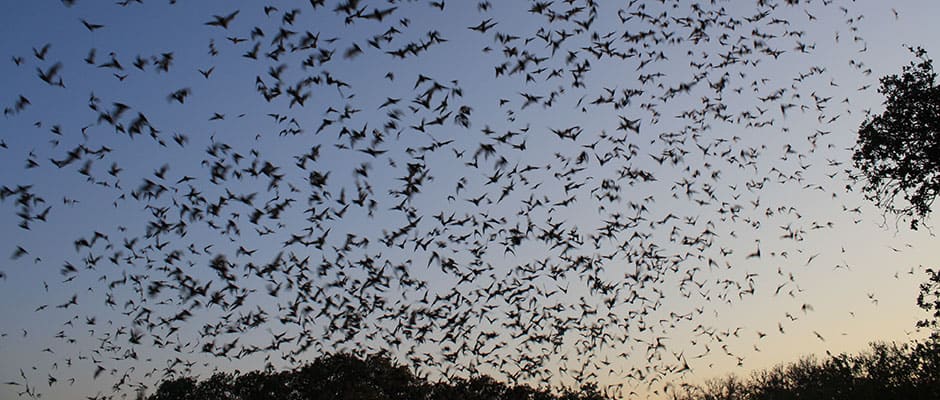Share this article
Bats Need Natural Habitat for Food Reservoirs
Bats eat so many insects that surround crops during the summer that they can act as natural pesticides for farmers, but researchers recently examined what bats consume later in those summer months when the crops are no longer flourishing.
Predicting that bats mainly feed on insects and pests, the researchers, who published their study in Biological Conservation, studied Brazilian free-tailed bats (Tadarida brasiliensis) in heavily farmed areas of Texas, where the species migrates to from Mexico. As part of the study, the team set up insect pheromone traps and bat detectors in the agricultural crops as well as in adjacent natural habitats to determine where these bats would go to forage. In all, the researchers collected almost 10,000 hours of recordings of bat calls from 15 monitoring sites.
Research showed that in the beginning of the summer, the bats foraged in the agricultural fields on insects such as moths. However, in the later part of the summer, bats began to rely on other insects in the natural habitats since the crops were less flourishing and the pests were gone.
This means natural habitats are important for these bats, said Jean Philippe Lessard, an assistant professor at the University of Concordia and a co-author of the study. This is especially true later in the summer months when bat mothers begin lactating and feeding their offspring. “Natural habitats are crucial in making sure they have food in that part of their lifecycle,” he said.
For bats, which are facing the plague of white-nose syndrome and whose populations are declining 80 to 100 percent in Quebec, maintaining habitat is something that people can help with, according to Lessard. “We want to do everything we can to provide them with the best habitat conditions,” he said. “It’s crucial in their landscapes that are heavily modified for agriculture, to preserve habitat patches.”
Their strategy is to discuss this notion with farmers, Lessard said, especially since bats can help farmers save money on pest control. “The natural habitat farmers keep on their lands have a purpose,” he said. “Bats use them as a reservoir for food. We hope that we can create dialogues about this.”
While this research was done on one particular bat species, it can potentially apply to all insectivore species of bats that are using habitat that is heavily modified for agriculture. Researchers also rely on www.batwatch.ca, a website where citizens can report when they find a colony of bats. “This is important because we’re building data on where the bats are found,” Lessard said.
Header Image:
Mexican free-tailed bats, a subspecies of the Brazilian free-tailed bat, exit Bracken Bat Cave in Texas. Researchers recently discovered that in heavily agricultural areas, bats rely on natural habitat when crops are no longer flourishing in later summer months.
Image Credit: USFWS/Ann Froschauer








